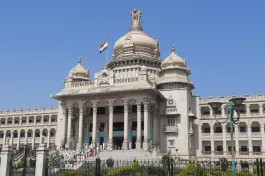A story is told that on the day Bhagat Singh was to be hanged in the Lahore Central Jail on 23 March, 1923, he requested his lawyer to bring him a book by Lenin. We do not know if the lawyer indeed got him the book, or if, Bhagat Singh was spared enough time by his stern jailers to read the book. Perhaps the story is apocryphal and is a powerful reminder of how deeply Bhagat Singh loved the world of ideas and books. On the day he was hanged, a couple of months over the age of 23, he had already read a corpus that most people do not manage in the fullness of their lives. He read novels, political treatises, history, jurisprudence, biology, colonial ethnographies, poetry, plays and philosophy.
The opening page of Bhagat Singh’s famous prison notebooks, are inscribed with two epigrams: one from Shakespeare; the other from Ghalib.
What accounts for his voracious reading? Why was Bhagat Singh so possessed with the idea that more than anything else he had to always surround himself with a library? And his eclectic reading tastes ranged from the classical tradition to high modernity. For instance, in poetry he read both Mirza Ghalib and William Wordsworth. When it came to political treatises he immersed himself both in Rousseau and Marx. The range in novels was much greater: Fyodor Dostoevsky, Maxim Gorky, Charles Dickens, Jack London and Upton Sinclair. The opening page of Bhagat Singh’s famous prison notebooks, are inscribed with two epigrams: one from Shakespeare; the other from Ghalib. 1 Several editions of the prison notebooks are available. I have followed the latest: Malwinder Jit Singh Waraich, series editor and Harish Jain ed., Bhagat Singh Jail Notebook (Chandigarh, 2016). This can be supplemented by the recent collection by Chaman Lal, The Bhagat Singh Reader (Noida, 2019). How does one decode his reading habits?
Some clues can perhaps be found in comparing him to Nehru, another great reader in the history of the subcontinent. In an illuminating essay, the late Mushirul Hasan, tells us that between May 21, 1922 and January 29, 1923 Nehru read fifty-five books. 2 Mushirul Hasan, “Nehru: The Writer, the Historian,” The Hindu, November 13, 2014. This certainly amounts to at least one book a week. Much as in case of Bhagat Singh, we can ask what is driving Nehru? It is never easy to fathom all of Nehru’s complexities, but when it comes to his readings, one can easily detect that he was often concerned with what truths could be gleaned from India’s past in order to guide the nation’s future. We get a clear sense of his abiding concern with the civilisational past from many passages in his writings and speeches.
A prominent example of this synthetic mode of thinking can be found in the following passage:
“What is my inheritance? To what am I an heir? To all that humanity has achieved during tens of thousands of years, to all that it has thought and felt and suffered and taken pleasure in, to its cries of triumph and its bitter agony of defeat, to that astonishing adventure of man which began so long ago and yet continues and beckons to us. To all of this and more, in common with all men. But there is a special heritage for those of us of India, not an exclusive one, for none are exclusive and all are common to the race of man, but more especially applicable to us, something that is in our flesh and blood and bones, that has gone to make us what we are and what we are likely to be. It is the thought of this particular heritage and of its application to the present that has long filled my mind, and it is about this that I should like to write … I can not do justice to it, but in attempting it I might be able to do some justice to myself by clearing my own mind and preparing it for the next stages of thought and action.”3
Nehru wrote these words in 1944 while he was imprisoned in the Ahmednagar fort. Try as he may, Nehru, despite his avowed internationalism and interest in world history, could never unshackle himself from India’s past, even when he found parts of it deeply nettlesome. However, his self-confidence and unbridled optimism always assured him that what was ugly in the past could always be sanitised and repurposed for the greater good.
Bhagat Singh carried no such brief for the past. He took India’s civilisational distinctiveness as a given fact. The burdens of the past required no excavations. The traumas and glories of the past 5000 years did not call for the performance of any myth-making exercise. And this principled insistence on refusing to deploy the past either symbolically or rhetorically was not because Bhagat Singh can simply be caricatured as a man of action. By all accounts he was reflective, spent long hours scouring and reading books and often what he learned was retained either through spectacular feats of memorisation or taking extensive notes.
Like all avant-garde artists, Bhagat Singh was an iconoclast wanting to break old moulds, burn putrid canvases and hurriedly remake the world. As a result the central question that possessed him was in what image would the world be remade? To answer this question, as Walter Benjamin would say, Bhagat Singh unpacked his library. A Bhagat Singh biographer, M.M. Juneja tells us: “he read nearly 50 books during his schooling (1913-21), about 200 from his college days to the day of his arrest in 1921, and, approximately 300 during his imprisonment of 716 days from April 8, 1929, to March 23, 1931.” 3 M.M. Juneja, “Bhagat Singh used to literally devour books, set a record of sorts,” in Times of India, March 22, 2011.
[B]hagat Singh was not the one to be deterred by the odds stacked against him. What he lacked in formal education he made up through ingenuity and perseverance.
But what this list does not tell us is the persistent hardships both in terms of logistics and intellectual mapping that Bhagat Singh had to negotiate to get to these books. I will list three challenges that Bhagat Singh faced in his pursuit of an unscripted future. First, the sort of books Bhagat Singh wanted to read in many instances were proscribed by colonial censors. Yet fortunately he found obliging booksellers in metropolitan Lahore who were happy to smuggle texts that the colonial administration, always paternalistic and insecure, deemed too seditious for local consumption. Second, English was not his first language. Unlike Nehru who was home schooled by several European tutors and then went to Harrow and earned a Tripos from Cambridge, and a law degree in London, Bhagat Singh had to do with a patchy provincial education. But Bhagat Singh was not the one to be deterred by the odds stacked against him. What he lacked in formal education he made up through ingenuity and perseverance. To decipher the unknown English words in the books he read, he always carried a pocket dictionary with him where ever he went. Third, it is much easier for any public intellectual to articulate a world-view if one can rely on an established cannon of ideas and outlooks.
Perhaps this is the key reason that Nehru constantly taps the past. And it is not just Nehru who is comforted and engaged by the lexicon of classical tradition. Many public intellectuals and political activists in South Asia and globally demonstrate similar trajectories. They followed certain established texts and genealogies. As Edward Said, often pointed out, it is very hard, if not next to impossible, to make fully independent moves on the chessboard of critical ideas.
In his intellectual originality, ethical orientations and ultimate sacrifice, Bhagat Singh remains singular.
For instance, it is hard to think of Marx independently of his intellectual predecessor Hegel. Marx’s idea that there are historical laws was based on Hegelian phenomenology and historicity. Similarly, Immanuel Kant’s much deserved acclaim as the foremost thinker of the Enlightenment, is deeply indebted to David Hume’s philosophical formulations concerning empiricism and the role of emotions. And the same is true of Sigmund Freud. Without Nietzsche’s philosophical hammer the great Viennese therapist could not have dreamt about civilisation and its cauldron of discontents. Antonio Gramsci, to whom Bhagat Singh has often been compared, wrote extensively in his prison notebooks on the nature of the modern state, cultural hegemony and war of attrition but he could often and without any anxieties turn back for inspiration and affirmations to the Renaissance figure from 16th century Florence, Machiavelli. 4 On how Machiavelli becomes a key resource for Gramsci see the Modern Prince section, particularly, “ Brief Notes on Machiavelli Politics,” and “Machiavelli and Marx,” in Quintin Hoare and G.N. Smith eds., Selections From Prison Notebooks of Antonio Gramsci ( London, 1973), pp. 125-35.
Closer to Bhagat Singh’s time, Lenin in the years preceding his return to Russia in 1917 spent considerable time in Switzerland, refining his understanding of dialectics and the unfolding of history, by closely reading Hegel’s: Science of Logic and Philosophy of History. 5 For Lenin’s Hegel Notebooks (1914-15) sometimes also called Philosophical Notebooks see K. Anderson, Lenin, Hegel and Western Marxism (Urbana, 1995). Bhagat Singh seems to have definitely read extracts if not the entire work, Imperialism (1916). See Malwinder Jit Singh Waraich,series editor and Harish Jain ed., Bhagat Singh Jail Notebook (Chandigarh,2016), p.119. And it has often be speculated that the book by Lenin that Bhagat Singh wanted to read Lenin just before he was hanged was State And Revolution (1917). Two of Lenin’s well-known tracts: Imperialism and the subsequent State and Revolution, heavily relied on Hegelian dialectics.
Unfortunately, for his hyper-modernist political project the young Bhagat Singh could not draw on any such deep cultural genealogies or intellectual affiliations. For his idea of revolutionary India he had to start on his own, literally from scratch. He had, unlike the Indian liberals - Gokhale, Gandhi and Nehru - no philosophical predecessors to count upon. 6 For the long chain of liberal thinkers in India see Christopher Bayly, Recovering Liberties, Indian Thought in Age of Liberalism and Empire (Cambridge: 2011) It is for this reason that Bhagat Singh immersed himself in the writings of Rousseau, Marx, Engels, Dostoevsky, Lenin and Trotsky. 7 The easiest way to get a glimpse of Bhagat Singh’s prodigious readings is to consult his prison notebooks. See Waraich and Jain, Jail Notebook. And as he reflected on the epistemic universe of these intellectual giants we can experience first-hand in Bhagat Singh’s writings a palpable excitement at discovering new ideas, a modern political vocabulary and possible structures of alternate thoughts for postcolonial India. We get a taste of what he was savouring, if we closely read his extensive writings. Here is one example:
“Having discussed the present situation, let us proceed to discuss the future programme and the line of action we ought to adopt. As I have already stated, for any revolutionary party a definite programme is very essential. For, you must know that revolution means action. It means a change brought about deliberately by organized and systematic work, as opposed to sudden and unorganized or spontaneous change or breakdown. And for the formulation of a programme one must necessarily study: 1.The goal 2. The premises from where to start, i.e., the existing conditions 3. The course of action, the means and methods.” 8 Bhagat Singh, “To Young Political Workers (1931),” in S. Irfan Habib, Inquilab, Bhagat Singh on Religion And Revolution (Delhi, 2018), Part 3
Bhagat Singh’s long hours of readings and surmounting innumerable challenges eventually produced a new narrative for India. What had once been an unscripted future turned into a viable political and ethical project. He never shied away from this project and systematically attended to such grand themes as: honour; heroism, suffering; mutual obligations; moral luck; justice, redistributive mechanisms, the nature of our collective beliefs and illusions. The fact that Bhagat Singh could attend to such a varied list of questions in his brief life of a little over 23 years is remarkable. But what is even more admirable is that through his writings Bhagat Singh became a conversation partner on equal terms with intellectual giants like Marx, Bakunin, Lenin and Trotsky.
Nehru has countless institutional and literary accomplishments to his credit, including a profound understanding of India’s past and an uncanny ability to read Gandhi’s mind, but he does not demonstrate much interest in sparring on equal terms with the theoretical founders of global modernity.
In his intellectual originality, ethical orientations and ultimate sacrifice, Bhagat Singh remains singular. The great benefit of documenting his reading habits is that through such a hermeneutic exercise we can begin to see how he provided a futuristic paradigm for the Idea of India.









